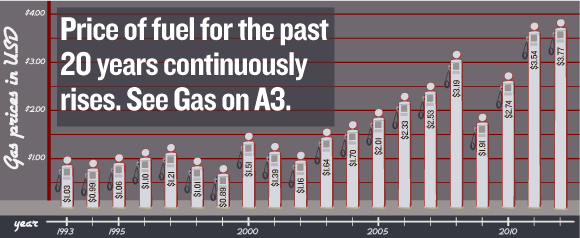
Gas — Since 1993, gas prices have more than doubled. Current prices are putting a toll on the U.S. economy, causing transportation services to increase. Once transportation costs increase, costs for goods and services are only a step behind. Source: U.S. Energy Information Administration. Graphic by Elliot Mosher
With gas prices on the rise, many Americans wonder if relief at the gas pumps is somewhere in the distance or if high gas prices are here to stay.
Associate Professor of Finance and Economics at Liberty University Robert Rencher spoke about the basic principles of supply and demand and their effect on skyrocketing gas prices.
“The demand for oil is increasing worldwide, so that tends to put upward pressure on prices. If at the same time demand goes up, supply goes down — basic economics — this puts greater upward pressure on prices,” Rencher said.
Another contributor to gas prices is the increase in tensions with the Middle East, especially with Iran.
According to an article from the Associated Press, oil prices have been rising partially because of tensions surrounding Iran’s nuclear program.
“Oil prices get kind of jumpy when things are going on throughout the world that may cause a potential disruption of supply. There is a political dimension to oil prices that is driven by uncertainty,” Rencher said.
In addition to geopolitics, gasoline prices are taking another hit as refinery operations in the Northeast are beginning to shut down, which decreases supply.
According to a recent article by the Wall Street Journal, the refineries that convert crude oil into gasoline have been losing money because of the price increase in crude oil in the past year.
Many refineries have been unable to compensate for the rising prices.
According to the Wall Street Journal, high gas prices could present a risk to the economy, which has been showing improvement this year.
Another concern many have is the typical increase in the price of gas during the summer driving season. Gas prices are typically three percent higher during the summer, according to the Wall Street Journal.
The Associated Press said the continual price increase might also begin to take a toll on local businesses and economy.
“There can be a ripple effect if gas goes up significantly. If it’s costing me a greater percentage of my disposable income for gasoline, I’m not going to be spending as much on other things. That can eventually have an impact on the economy as a whole,” Rencher said.
In addition to the impact of gas prices on the national economy, many students have felt the strain on their personal budgets.
Liberty sophomore Erik Beam said that gas price influences the money he spends in other areas of the economy.
“Unfortunately, it hasn’t stopped me from driving as often. Instead, it makes me spend less money in other areas because I’ve got to keep in mind money for gas,” Beam said.
Freshman Zach Koon personally combats gas prices by using a Kroger card for gas discounts.
“I have a Kroger card that saves me 50 cents per gallon because my parents buy so much food each month. I also drive a car that gets 35 miles per gallon, so I don’t have to get gas that often anyway,” Koon said.
Hudson Crider and Emily Raush, an engaged couple from Lancaster, Pa., have felt the strain of high gas prices directly impact their driving decisions.
“The cost doesn’t really cause us to drive less around Lynchburg, but it definitely makes us think before taking a day trip somewhere,” Raush said. “Also, due to gas costs, we really only go home on the big breaks. We normally have people ride with us to help with the cost of gas, but we did not do this over spring break so it was pretty costly.”
Gasstation
January 28, 2018
I do hope gas prices will go down soon.